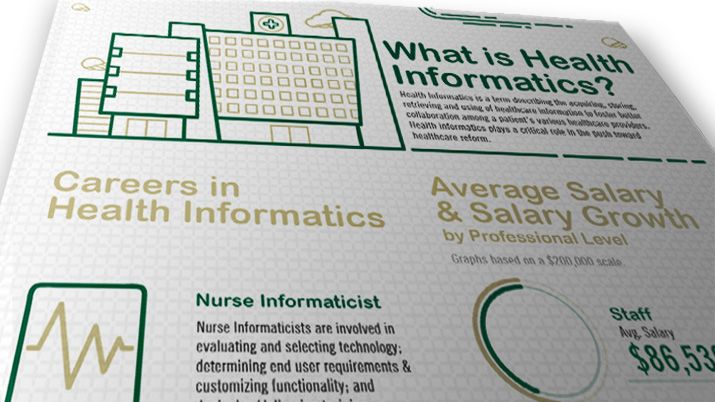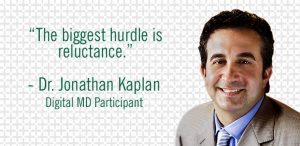Demand for health informatics jobs is predicted to increase over the next decade. Medical facilities from hospitals to nursing homes are scrambling to find qualified professionals to help successfully complete federally mandated goals to implement the “meaningful use” of electronic health and medical records.
While many college programs can equip individuals with the basic knowledge needed to enter the field of health informatics, those looking to enter top jobs in the field need more targeted educational programs.
Health Informatics Careers
Job descriptions and titles can vary from setting to setting, but the following job descriptions outline a few of the most in-demand jobs:
1. Health Informatics Consultant
This independent position allows healthcare facilities to meet federal mandates while keeping employment overhead costs low. Health informatics consultants can be brought in to complete a wide variety of task such as:
- Updating networks
- Installing software
- Monitoring systems and troubleshooting
- Training teams
While some consultants have been in the field for a significant number of years and do not possess advanced degrees, it is becoming more common for consultants in health informatics to hold a master’s degree. There is a wide range of salary potentials for consultants based on area of specialty and other factors such as geographic location. The American Health Information Management Association (AHIMA) U.S. Salary Survey Report shows the average salary for the health informatics consultant career path to be over $88,000.
2. Health Informatics Director
This executive level leader combines a penchant for technology with a wide array of “people skills” aimed at integrating and organizing the flow of data across different divisions. These leaders are also responsible for:
- Training teams on new technology
- Meeting with stakeholders and constituents such as physicians, nurses, and pharmacy staff to roll out technological protocol changes
- Recording, analyzing and mitigating technology issues and challenges
Most health informatics directors will hold a master’s degree, yet some that have grown with the field may hold a bachelor’s degree along with many years of experience. While salary ranges will vary geographically, AHIMA reports that by job level, a health informatics director can average a salary of over $100,000 per year.
3. Nursing Informatics Specialist
No one knows the importance of efficient and effective patient care plans as intimately as nurses who are often charged with creating them and seeing that they are carried out. Because of this expertise, a number of health care settings are actively seeking nurses interested in technology for emerging health informatics jobs. Working directly with other nurses and health care providers, a nursing health informatics specialist handles details such as:
- Training other nurses on changing record-keeping protocol
- Working toward reducing redundancy and inaccuracy in patient care plans
- Analyzing and addressing logistics of technology in direct patient care
4. Chief Medical Information Officer
The roles and responsibilities of chief medical information officers will vary from organization to organization. Overall, they are responsible for the effective and efficient flow of information and construction of IT systems to support a high quality of patient care across multiple information systems. Other duties typically involve:
- Conducting data analytics to improve IT infrastructure
- Participating on a variety of IT governance boards
- Designing and applying software applications
- Training software development teams
While some chief medical information officers work in hospital settings, others may work in academic settings, as well as in government agencies driving policy decisions. There is a wide variety of experience and education needed to be competitive in top jobs in this field. A master’s degree or Ph.D. is often required for the most elite opportunities, such as with a professional society or life sciences research facility. The AHIMA U.S. Salary Survey Report shows salaries for these C-suite executives can range from $97,000 to well over $100,000.
5. Electronic Medical Record Keeper
Electronic Medical Record Keepers input specific patient data, such as symptoms, conditions, diagnoses, treatments, and other pertinent information into software programs and applications used by the healthcare facility. Hospital administrators, medical researchers and insurance companies use the information compiled by electronic medical record keepers to help plan future movement of the organization. Electronic Medical Record Keepers typically:
- Ensure patient records are filled out properly, accurately, and completely
- Assign codes to patient data within electronic medical record systems
- Consult with physicians to ensure the accuracy of patient record(s)
- Collect information for medical researchers and studies
- Disperses information to those allowed to receive medical information such as insurance companies, family members, guardians etc.
Because the Affordable Care Act mandates that healthcare providers transition to electronic medical records or face serious financial penalties, there is an expected influx of hiring for this position.
6. Healthcare IT Project Manager
The Health IT Project Manager coordinates and maintains communication with project members to ensure objectives and goals are met and that projects are completed on time.
Healthcare IT Project Managers typically focus on overseeing the larger and often highly complicated projects involving technology advancements.
Professionals in this field:
- Creates and execute project plans while revising as needed to meet changing needs and requirements
- Identify necessary resources needed for project completion
- Discuss and review deliverables with project members
- Minimize errors and risk exposure
Other Career Considerations
The U.S. Bureau of Labor Statistics projects a 15% growth in all healthcare occupations from 2019 to 2029, with a growing need for skilled, versatile, and well-trained health information specialists throughout the end of this decade. While a wide range of opportunities exist, competition is toughest for top jobs. Completing a master’s degree can help you leverage a competitive edge and demonstrate to a prospective employer your potential for maximum effectiveness on the job.
USF Health’s Morsani College of Medicine offers a Master of Science in Health Informatics and Graduate Certificate in Health Informatics the only graduate credentials of their kind offered 100% online through a top medical school.
*National long-term projections may not reflect local and/or short-term economic or job conditions, and do not guarantee actual job growth. Information provided is not intended to represent a complete list of hiring companies or job titles, and program options do not guarantee career or salary outcomes. Students should conduct independent research for specific employment information.




